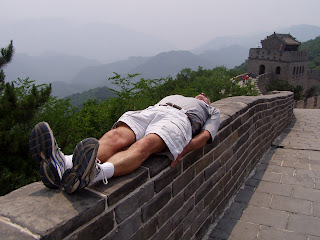A few weeks before we were scheduled to leave for our China trip my wife was talking to our 30-year-old daughter about the trip and during the conversation my wife used the term “Oriental” when referring to the Chinese. Our daughter was quick to chastise my wife for using such a derogatory term when referring to people from China. My wife was taken aback by our daughters comment and said she had no idea that the word “Orientals” was so offensive.
Later that day my wife asked me if I realized the word “Orientals” was considered an ethnic slur. My response was; “you’ve got to be kidding me, I had no idea”. After due consideration I thought, wait a minute have I been living in a different universe? When did I miss the decree that the word “Oriental” can no longer be used? What else have I missed? Have I been offending people when I call the English Brits, Canadians Canucks and Australians Aussies?
I mean I know I shouldn’t use the term Krauts when referring to Germans, or Frogs for the French and Polack when referring to the Polish but where did the ban on calling Chinese Orientals come from? Could I really be an old fogie who has become a bigot in my old age? Wait a minute; did I just use a senior ethnic slur against myself? This is becoming way too complicated. I can assure you the last thing I want to do is offend any ethnic group but this seems to me to be political correctness run a muck!
Once we arrived in China I decided to do a little investigating on this thorny issue. I donned my Inspector Closeau disguise and began my investigation. My first “suspect” was an Oriental Asian woman on our tour who was born in Hong Kong and now lived in Canada. I asked Ava if she would be offended if I called her an Oriental. She looked at me rather dumbfounded and said; “what are you smoking? Of course I don’t take offense with that term. Orient means the east, China is in the east, I am from China, and therefore I am oriental”.
I thanked her for her directness and as I was leaving she said; “by the way Gerry take off that Inspector Closeau disguise. You look stupid, everyone knows its really you and it makes you look uncomfortable”. I again thanked her for her honesty but as I was leaving I had a feeling that since she really was now a Canadian maybe she really didn’t know the proper answer to my question. I continued to pursue my investigation sans the Inspector Closeau disguise.
At dinner over the next several nights I asked a number of people from our tour group, none of them were Oriental Asian, if they thought the term “Oriental” was derogatory. Every person said “of course not”. A few people did say it may be a dated term but there is certainly no malicious intent associated with the use of the word. I was starting to feel pretty good that my wife and I are correct to use the word “Oriental” but my investigation was not yet complete.
As a final test to determine the appropriateness of the term “Oriental” I interviewed a number of the guides for our tour. All of our tour guides were born and raised in China; all that I talked to have visited America and they all speak English as well as I do. When I asked them if it was OK to refer to them as Orientals to a person they all said “yes”. I finally felt vindicated that I can still call people from the far east Orientals but if a person does take offense I will offer my apology and refer to them as Asians in the future.
So, the answer to my initial question is; “yes, China is loaded with Orientals”.
As a final bit of investigative work I did google the phrase; “use of the word Oriental” and found the results to be a muddled mess. I did find one article of interest which I include as part of my report.
Why is the word "Oriental" considered derogatory?
My father does a lot of business in a place that I call "Asia", but which he refers to as "The Orient". And he's friends and colleagues with many people that I call "Asians" but he sometimes calls "Orientals".
A lot of people consider the word "Oriental"---which simply means "Eastern"---to be out-dated and/or derogatory. But is it? And if so, why? I found an interesting answer on
Wikipedia, a website which never contains inaccuracies:
"Some people think the term 'Oriental' is derogatory, largely because of its connection to imperial 19th century Europeans and Americans who are thought to have held a patronising attitude towards the region. ... Major objections to the use of 'Oriental' are chiefly limited to North America. Its use is much less controversial in Europe and Hawaii, as well as in Asia where, especially in Southeast Asian countries, the word is in comparatively widespread usage. In Europe the term is used to describe such things as the East's cuisine and goods, ancient culture, and religions, at times to denote an exotic quality with upmarket or mildly positive connotations."
So, North Americans are still upset because of attitudes that prevailed in the 19th century. Huh?
My dad is either very worldly, or just far and above philistine American backwardness and isolation. And damn, he's so down with his brothas and sistas from China, Thailand, Korea and Indonesia, that he's even allowed to call them 'Orientals'. My dad is The Shit, people.
Or maybe it's because in the 60s he occasionally played bass for Katherine & the Firebyrds


